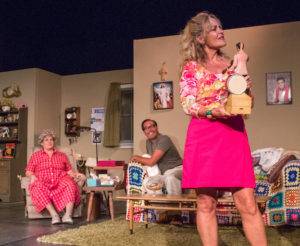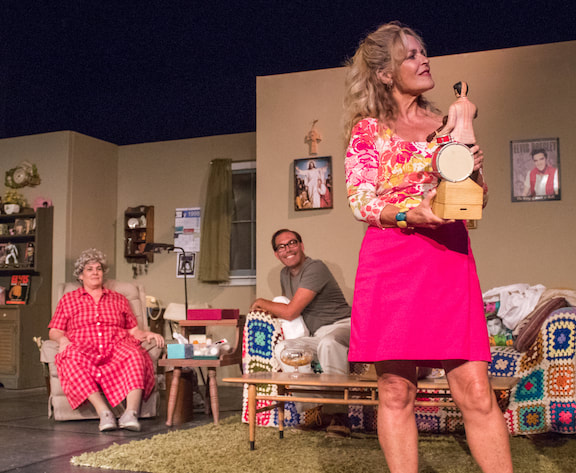by Sami Zahringer, Ojai Valley News
Photo by Stephen Adams
 “Bless Your Heart,” now playing its world premiere at Ojai Art Center Theater, goes right to the heart of the culture wars between religion and secularism, knowledge and faith. It pulls no punches, but with a tender, hilarious, invigorating script, it manages to transcend the warring rhetoric and tell the story of an ideologically opposed family not at peace with itself but trying hard to be when mutual understanding is thin on the ground.
“Bless Your Heart,” now playing its world premiere at Ojai Art Center Theater, goes right to the heart of the culture wars between religion and secularism, knowledge and faith. It pulls no punches, but with a tender, hilarious, invigorating script, it manages to transcend the warring rhetoric and tell the story of an ideologically opposed family not at peace with itself but trying hard to be when mutual understanding is thin on the ground.
The story is a dramatized autobiographical moment in the life of the playwright, Richard Camp of Ojai, a man born in North Carolina to an extremely evangelical family, who saw education as his way out. He grabbed it, ran with it, and became an Emmy-nominated writer and director, living a life of learning and ideas thousands of miles from his origins both geographically and ideologically. It’s revealing, intensely thought provoking, searingly honest, and very, very funny.
Camp is represented in the play as Thomas (David Nelson Taylor), a college professor home to attend the wedding of his 17-year-old brother to an obviously pregnant teen, denying her pregnancy. Nobody wants the youngsters to get married. Thomas is thrust back into the Southern Baptist world of his youth where pictures of Jesus and Elvis hang side by side on the wall, family members regularly quote the Bible, and his unhappy, overbearing mother admonishes him with “Don’t use words bigger than my bottom.”
Martha, Thomas’ mother, is unforgettable. A woman run largely to seed in comparison with her pretty, bubbly, 11-times-married sister, Lucille, she is on nine different medications for anxiety, diabetes, thyroid problems (“Yeah, your thyroid’s too heavy!”) and keeps a gun next to her TV. She is a complicated, intellectually alive figure of razor-sharp wit, but extremely constricted worldview, who has never had any education outside of literally interpreted Bible-reading and daytime TV. She is self-pitying, self- sabotaging, demanding and desperate for love. Somehow, all of this is played with both subtlety and force by Susan Kelejian in a masterful portrayal of anxious, disappointed, self-excoriating and, for that matter, everybody-else-excoriating, motherhood.
Martha and Thomas’ relationship is mutually baffling and frustrating, but marked with love and the longing to be understood. One of the most scouring and powerful scenes in the play happens when Thomas’s younger brother, John David, explodes at Thomas in a blistering indictment for abandoning him. Where Thomas got out to explore his options as soon as he could, he left no option for his younger brother but to stay at home and look after their mother.
The shock, shame and self-realization Thomas feels could not have the audience-hushing power it does without an exceptional actor playing John David. Chance Kelejian plays this sweet, protective boy of great decency with rangy, loping, self-effacing good humor, so when he blows up into a painful adolescent rage of resentment and loss, we keenly feel and are taken aback at the burden he’s been carrying on his young shoulders. We suddenly see depths and facets of John David in a way that he would never reveal to the world outside. We feel the strains and constraints of family ties, we see his fierce loyalty and, for all Thomas’ exhortations to get an education, how that, for John David, is meaningless and ridiculous given the realities he has to take care of.
We see the very real limitations of poor Southern youth and their powerful need to manage their expectations accordingly.
John David’s fiancée, Charlene, is played with affecting ditziness but great dimension by Kisea Katikka, who hints at a grittiness and practicality in Charlene’s disposition. Some of the sharpest, funniest lines in the play are given to Martha’s sister, Lucille. Bottle-blonde, bouncy, trim and particular, Julie Denney Hamann breathes exuberant life into them, deploying compliments and criticisms alike with breathless, direct Southern charm wielded like a lace-covered iron fist. No punches are pulled, but what a delightful way to be assaulted!
Lucille’s vivacity highlights Martha’s depression that only seems to begin to lift slightly with the return of Thomas’s stepfather, J.D., a violent gas-attendant-turned preacher who ran off with another woman years before. He has heard that John David is getting married but come back with more than wedding attendance in mind. Played with wily, slithering, Bible-thumping ferocity by Michael Holden, J.D. is manipulative in the extreme as he swaggers in arrogantly, in full expectation that a few sweet words will be all it takes to win Martha back. Does he really want her back though or is he just shoring up his “good deeds” for Judgment Day?
His arrival throws the already-upset household into confusion and the volatile menace he brings is palpable. The threat of violence is real and his Bible-waving hypocrisy is as nauseatingly self-serving as it is dangerous to Martha because she is lonely, desperate to be loved and vulnerable to his lies and self-professed “saved” status in the eyes of the Lord.
For Martha, it’s an object she simply cannot comprehend with her blinkered worldview. She reads the articles and clippings Thomas sends her, though, and confesses she always secretly wanted to be a teacher. In an extraordinary scene near the end of the play, her world does go dark. Martha steps forward alone into a spot of light on the stage and, in clearly ringing, confident, and articulate tones, she describes the woman she could have been had she had an education. It’s a masterful, dramatic stroke of character development and thematic poignancy.
In a sweet Ojai twist to this Southern tale, Camp commissioned renowned local composer Judy Vander to write original music for the celebrated last few words of Darwin’s “Origin of Species” Broadway singer and local actor Asunta Fleming performed on and recorded.
In every way and at every turn “Bless your Heart” is truly excellent. It’s timely, important and, at once, both depressingly and optimistically real. It is genuinely one of the best, most meaty pieces of theater this reviewer has ever seen, all leavened with crackling Southern humor. In this play, contemporary, complicated domestic tensions in poor, “white-trash” America, serve as a backdrop in the theater of ideas, asking some of the biggest questions ever faced; long conversations are sure to be sparked among those who see it.

